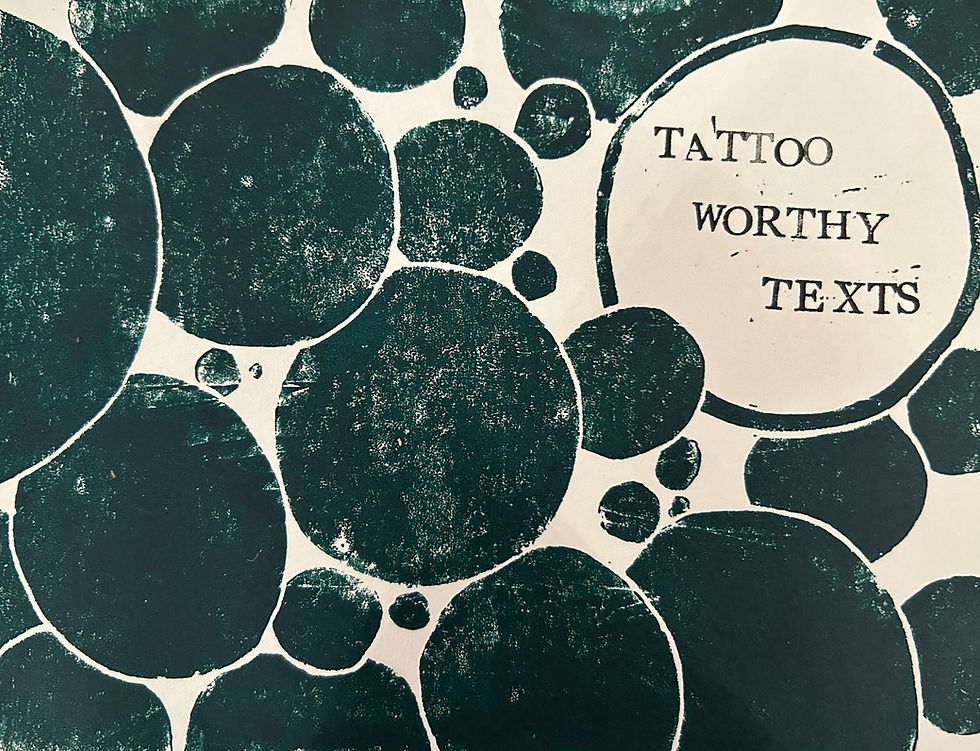Tattoo Worthy Texts 3 - Breaking Open
- rabbirobynashworth
- Feb 23, 2024
- 3 min read

Whenever I teach, I hear myself, saying, ‘if I could get this phrase tattooed, I would!’ I am obsessed with words. I am hooked on discovering teachings that connect all the dots and turn my thinking upside down. I love finding words that break open new possibilities I didn’t even know existed. Aside from my very low pain threshold, I would run out of space to get all of the words that have transformed me tattooed. So in lieu of finding a parlour that could do the miraculous, I’m going to share some of my favourite words and sentences that have blown me away. Knowing that the Internet is a type of memorial, given the impossibility of erasing anything that is ‘out there’ digitally, I hope that these words start conversations of critical thinking and connection.
Prints by R.Robyn. Please ask permission or cite the author/artist if you are quoting any words or re-producing the art. Ta!
__________________________________________________________________________________
Ready? Here we go.
Judaism is the deconstruction of oppressive meta-narratives.
Rabbi Dr Judith Rosen-Berry
Rabbi Judith said this sentence as an aside in one of our classes at Leo Baeck College. I had to take a moment. In just a few words and sounds she had encapsulated my understanding and beginning of my imagination of what Judaism could be.
Here's how I currently understand the impact of what this could mean:
We would realise nothing is final or the only truth . As soon as we thought 'that is Judaism', 'that it the way we do things', 'that's how we have always done it', 'that's not how things are done here', 'that is Jewish', 'that isn't Jewish' - we'd realise that it needed de-constructing and taking apart. We are Abraham - we smash idols. We are Moses - we break tablets, even if they contain the words of God. We are Rebecca - we question laws which would put power in the wrong hands. We are Hagar - we listen to the words of God in every place.
We'd know, deep in our bones, that Judaism demands we are involved in justice making and justice seeking. We are anti-oppression, in all its forms, and we are commanded to get involved in the real messy world, not remain hidden in our fortresses. As Rabbi Sheila Shulman (z"l) would teach - the spiritual and political are as one. And as Audre Lorde kind of added (if she was in a conversation with Sheila), we bridge the spiritual and political through the personal. We listen to each other - where we hurt. We connect the dots and see how systems are built to keep the vulnerable trapped and the rich wealthier. And we turn our attention to those.
Our purpose is to live holy lives and to be holy means to be critical thinkers, breaking apart that which is harmful and lifting up that which is nourishing. We look deeper. We don't stay at the peshat (the literal meaning of what is before us) we go further to the sod (what is hidden within).*. We recognise there are narratives so deeply embedded in our society that we barely notice them. When a woman is interrupted in a meeting we see the meta-narrative that 'women are there to be seen not to lead'. When someone is stopped at security at a synagogue's door for not being dressed right, we recognise the harmful narrative of 'you don't look Jewish'. When there is no accessible entrance to a place of worship we recognise the narrative 'you are not welcome here'.
Are we sustaining and maintaining? Are we establishing and securing? Or are we deconstructing and breaking open? Could we be courageous enough to do the latter? Let's see.
---------------------------------------------------------------------------------------------------------------------------
* Here I am referring to the rabbinic exegetical tool of PaRDeS which teaches there are multiple layers of meaning to a text to be discovered.




Comments